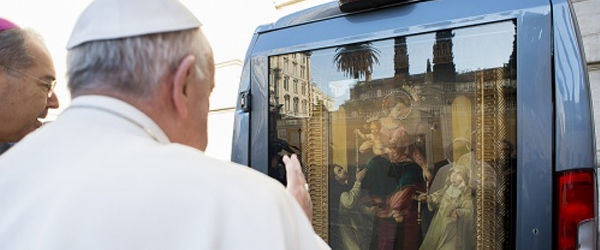“No te la creas.” That — “Don’t you believe it” in English —- was what then-Cardinal Jorge Mario Bergoglio (now Pope Francis) once told a relative who had been regaling him with his own accomplishments as a physician. The popular saying is used in Argentina when people think they are above others and that their achievements are of their own making.The story is one of many shared recently by the Argentinian media that reveals Pope Francis’ personality, said Cristina Vallina, consul general of Argentina in Los Angeles.“He has always been known for having an austere, simple life; a life dedicated to the poor,” continued Vallina, a Catholic educated in Catholic schools in the capital city of Buenos Aires, where people call themselves porte√±os (port people).“I remember that in his homilies he was very straightforward; he said everything he needed to say, as we Argentinians are used to doing,” she smiled.Argentinians, she added, wanted Cardinal Bergoglio to be the one elected as pope. When it happened, “We were deeply moved.” The diplomat highlighted the pope’s advocacy for workers object of slave labor and urban sweatshops, and his support of Cooperative 20th of December. Commonly known as La Alameda, the nonprofit was established in 2002 in one of Buenos Aires’ poor neighborhoods in response to the community’s most pressing social issues at the time: hunger and unemployment.Today, the government-subsidized organization runs several programs, including a dining hall that serves the community under a self-sufficient style of operation where the same people who are served do the cooking, cleaning and other chores.Cardinal Bergoglio frequently visited that community, said Vallina, celebrating Mass as well as baptisms of the children of the mostly immigrant seamstresses working at the sweatshops. It is well known in Argentina, she said, that the cardinal also ministered and celebrated Mass at a run-down area in Greater Buenos Aires, affected by drugs and prostitution.Since he became the capital city’s bishop, “villas” chapels have been developed, she added. They are a form of small chapels in poverty-striken areas known as “villas miseria” (shantytowns), where most people live in cardboard houses.“This is where mostly young new priests start their ministries,” said Vallina.The consul denied that there was tension between the pope and President Cristina Fernandez de Kirchner. “The relationship between the Catholic Church and government is cordial,” she said. “He is very respectful of human rights and other social issues.”Vallina said she expects that with Pope Francis’ guidance there will be a “renewed Church, guided with a firm hand, with great sensibility and intelligence.“The Church needs a change, it needs unity and he is able to do that. In Buenos Aires he presided and promoted numerous interfaith services with the large Muslim and Jewish communities.” Recent reports estimate that 77 percent of Argentina’s 42 million people are Roman Catholic. (Until 1994, the president and vice-president had to be Catholic). About two percent are Protestants, two percent Jews and 1.5 percent Muslims. Buenos Aires is home to one of the largest mosques in Latin America.“Undoubtedly,” said Vallina, “Bergoglio has a good head; he knows there is always someone above you: God.“These are good times for the world, not only for Latin America,” she continued. “It’s about time that we start acknowledging the importance of the different cultures and traditions and to stop our envies and resentments.“The pope comes from immigrant roots, from hard-working parents who instilled in him the importance of education. He could be a catalyst, an example of humility, of change.”The people of Brazil are also very happy with Pope Francis’ election, Bruno Barth, consul general of Brazil in L.A., told The Tidings.“We were excited already that the 2013 World Youth Day will take place in Rio de Janeiro, but it’s even more exciting that Pope Francisco will be attending,” said Barth. “The fact that he’s the first Latin American pope is a novelty in itself.”Barth said Brazilians are well aware of the friendship between the pope and Brazilian Cardinal Claudio Hummes, who is known for his pastoral work with the poor. “The Church in Brazil has a strong social dimension,” he said. “In the last 10 to 15 years there have been important improvements regarding social justice in Brazil. The Church has played an important role in helping alleviate poverty, so the pope’s attitude is very well-welcomed by Catholics in Brazil.“The Brazilian government has always worked closely with the Vatican and this relationship might strengthen even more with Pope Francisco.”{gallery width=100 height=100}gallery/2013/0405/consul/{/gallery}

